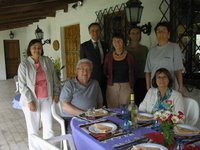

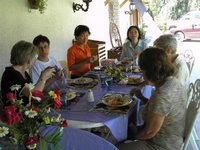 Fifteen creative writers, all far from their homelands of England, Canada, Holland, South Africa, Japan and Singapore. Our hostess and course organiser is Susan from England. The theme of transition is resonant; their words are fascinating. We work around a long table in the shade of the sala throughout the morning, then after al fresco lunch, the afternoon is free to read by the pool, swim, or walk around the parcela - smallholding - which comprises vineyards, fields of cattle and horses, and a small hill. As the afternoon sun becomes more gentle and the Evening Primrose flowers unfurl again, Susan appears with a tray of wine and tapas and announces Happy Hour. We reconvene, talking of poetry and publication and other passions, until its time for dinner.
Fifteen creative writers, all far from their homelands of England, Canada, Holland, South Africa, Japan and Singapore. Our hostess and course organiser is Susan from England. The theme of transition is resonant; their words are fascinating. We work around a long table in the shade of the sala throughout the morning, then after al fresco lunch, the afternoon is free to read by the pool, swim, or walk around the parcela - smallholding - which comprises vineyards, fields of cattle and horses, and a small hill. As the afternoon sun becomes more gentle and the Evening Primrose flowers unfurl again, Susan appears with a tray of wine and tapas and announces Happy Hour. We reconvene, talking of poetry and publication and other passions, until its time for dinner. Well that's a typical pattern...
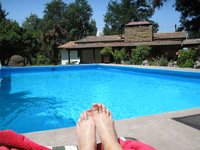
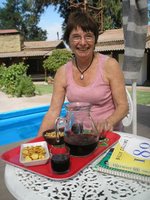
I did other things too - went hiking in the Andes, climbed a path to a glacier, took a trip to the coast and a tour of the crazy coast house of Pablo Neruda, Chile's Nobel Peace Prizewinning poet and favourite son.
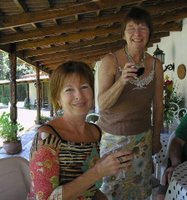
I went on the metro, and the bus, saw the bourgeois side of Santiago and the bohemian quarters, the downtown area and the new malls.
I toured museums and art galleries, sat in coffee bars and a seedy liquor bar, ate Chilean dishes at pavement cafes and in an elegant 15th-storey restaurant.
On the parcela where I stayed I saw amazing wildlife daily - butterflies as big as bats, a huge Great Horned owl like a primitive mask, tiny picui doves, quails dashing along the dust road with their chicks, scores of foraging falcon-like caracara, and listened nightly to the lapwings' screech.
I could go on about the flowers, too: the cactus with their red parasite-blossom, exquisite and deadly, and a kaleidoscope of exotica along the hillsides and verges.
But I think I'll shift focus from these unchanging aspects to what struck me most: the pace of change here.
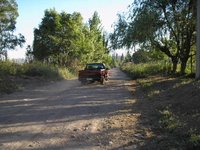

Acceleration is too slow a word for it. Everywhere I'm reminded of 70s sociologist and soothsayer Alvin Toffler, who warned that change itself is changing. Santiago is a boom town in a boom country.
Half of the population of Chile live here.
Susan's rural paradise is 20 minutes from the biggest mall I've ever seen, including a supermarket with 65 checkouts.
It's one of 29 around the city. The drive begins on a dirt track and joins a 6-lane highway. In one generation the huaso's children are quitting the labour that needs horses and big brimmed hats and flooding to the malls to stand at the checkouts. And prices may look good to the gringo, but here a basic monthly wage is around £100.
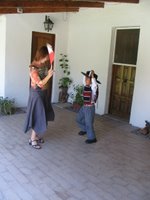
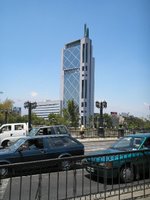
Of course it's impossible in 3 weeks to make value judgments, but I can't help being a bit sad to see Pied Piper of Dunkin Donuts and Macdonalds has lured so many children from their traditional culture. It makes me realise when we talk of the pace of change in the UK, we know nothing. Here I met people who had been residents less than a decade ago, now literally unable to recognise their own sector of the city. In a country where tax returns must be submited online not on paper, our parcela didn't even have a working phone as the lines are regularly vandalised for their copper.

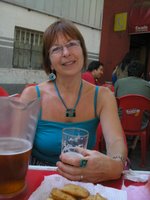 On a less Cassandra-like note, and despite the culture shock, I enjoyed every minute of my stay. I saw breathtaking scenery, basked in constant sunshine, met people who were generous and interesting, and above all enjoyed some amazing writing. I'm hoping to add some samples here, but in the meantime will end with a quote from a cafe wall which - now I've got it translated correctly - I intend to use as my motto for this year:
On a less Cassandra-like note, and despite the culture shock, I enjoyed every minute of my stay. I saw breathtaking scenery, basked in constant sunshine, met people who were generous and interesting, and above all enjoyed some amazing writing. I'm hoping to add some samples here, but in the meantime will end with a quote from a cafe wall which - now I've got it translated correctly - I intend to use as my motto for this year:"Sólo quienes se arriesgan en ir más lejos
descubren hasta dónde pueden llegar"
Only those who risk going further discover how far they can really go.
No comments:
Post a Comment